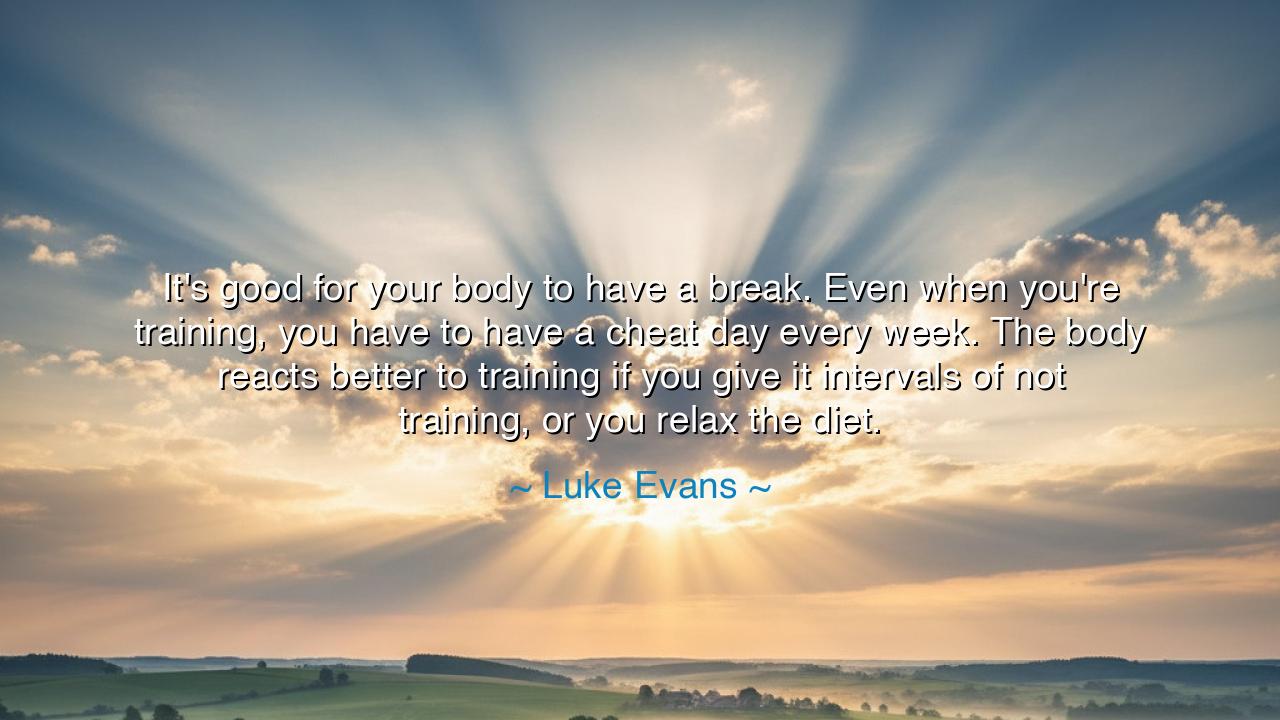
It's good for your body to have a break. Even when you're
It's good for your body to have a break. Even when you're training, you have to have a cheat day every week. The body reacts better to training if you give it intervals of not training, or you relax the diet.






In the words of Luke Evans, the actor and man of discipline, we hear a voice both wise and compassionate: “It’s good for your body to have a break. Even when you’re training, you have to have a cheat day every week. The body reacts better to training if you give it intervals of not training, or you relax the diet.” These are not the words of indulgence, but of balance, spoken by one who has walked the path of labor and understood the sacred rhythm between effort and rest. Evans reminds us that strength is not born from constant strain, but from the harmony of motion and stillness. For even the strongest bow must be unstrung at times, lest it lose its tension and snap.
In this saying lies a deep truth that reaches far beyond the gym or the table. The ancients called it the law of cycles—the eternal pattern that governs all things. The tides rise and fall, the moon waxes and wanes, the warrior fights and then lays down his sword to heal. The body, too, follows this rhythm. To train endlessly without rest is to defy the wisdom of nature itself. The heart that never slows will burn itself out; the mind that never pauses will lose its clarity. Thus, Evans speaks as one who knows that rest is not weakness—it is restoration.
Even the greatest civilizations understood this truth. In the times of the Roman legions, soldiers would march for days under the weight of armor and shield, but their generals, seasoned by years of battle, commanded them to rest before victory. They knew that fatigue is the enemy of precision, and exhaustion the companion of defeat. The wise commander saves his army by giving it pause. So too must we, in our daily battles, learn to honor our limits, not as failures, but as part of the sacred rhythm of endurance.
To allow a cheat day, as Evans calls it, is to recognize the humanity within discipline. It is a reminder that life must have sweetness amidst the striving. The ascetic who denies himself all pleasure risks turning strength into bitterness. The body, when given a moment of indulgence, remembers joy; and joy, in turn, renews purpose. Thus, balance becomes not merely a rule of fitness but a rule of life—to know when to push, and when to breathe. Relaxation, in this sense, is not surrender, but strategy.
There is an ancient tale from China of Lao Tzu, the sage who taught that the hardest thing in the world is not to fight, but to flow. “He who overcomes others is strong,” he said, “but he who overcomes himself is mighty.” Luke Evans’ words carry the same essence. To take a break, to step back, requires courage—the courage to trust that rest does not undo the work, but strengthens it. Just as the earth must lie fallow before it can bloom again, so too must the human spirit rest to rise higher.
The lesson here is both simple and eternal: do not mistake constant motion for progress. The arrow flies farthest only when the bow is drawn and then released. The warrior trains hard, but he also sleeps deeply. The artist paints furiously, but he also steps away to let the vision breathe. Likewise, in all pursuits—whether of the body, the mind, or the heart—one must embrace the rhythm of exertion and repose.
In practice, this means giving yourself permission to pause. Allow yourself the intervals of not training, the days of rest, the meals of joy. Celebrate your discipline by honoring its counterpart—recovery. For the body, the mind, and the soul are not machines; they are instruments, and every instrument must be tuned, not beaten, into harmony.
And so, Luke Evans’ wisdom endures as a timeless teaching: that true strength is measured not by how long you endure, but by how well you restore. The path to greatness is not an unbroken line of struggle, but a dance between labor and renewal. Remember this: the oak grows strong not only from the storm but from the stillness that follows it. Rest, therefore, is not an interruption of greatness—it is its foundation.






AAdministratorAdministrator
Welcome, honored guests. Please leave a comment, we will respond soon